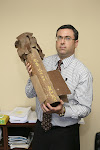- We generally do not mourn on Shabbos, therefore there are no public signs of mourning for Tisha B’av.
- There is a significant debate about learning Torah on Saturday after midday. Based upon the ruling of Rav Chaim Kanievsky Shlit”a in the name of the Chazon Ish Zt”l learning should be limited to matters permissible on Tisha B’av itself (e.g. mussar, Moed Katan, certain pages in Gittin, etc). At Yeshivat Yavneh we will have a shiur on Divrei Mussar. As per the ruling of the Shemiras Shabbos Kehilchasa (65:45) a community that normally has an afternoon shiur may continue to do so.
- We daven mincha earlier so that the Seudah Shlishit can be eaten well within the proper zman.
- At Seudah Shlishit we may eat meat, drink wine, and prepare a large feast.
- All regular zemiros may be sung at this meal.
- The meal needs to be concluded before sunset.
- One should not prepare their Eicha books or Kinos before Shabbos is over (unless they plan on using it to learn from on Shabbos itself).
- The shoes should not be removed until after Shabbos.
There are two primary customs with regard to changing shoes:
- Some communities begin Maariv at the usual time on Saturday night. The chazzan should say “baruch hamavdil bein kodesh lechol,” remove his shoes, and then say “barchu.” The congregation should respond to “barchu” and then remove their shoes.
- Some communities delay the beginning of Ma'ariv, allowing people to remain at home until nightfall. At the time of nightfall, everyone should say the phrase “baruch hamavdil bein kodesh lechol,” remove their shoes, and change into weekday clothes before Ma'ariv.
- Havdalah is performed without Besamim. According to some it is recited in shul before the reading of Eicha. According to others, it is recited at home before Ma'ariv, if there is time. We recite the bracha “baruch meorei ha’eish”. The rest of havdalah is recited after the fast.

